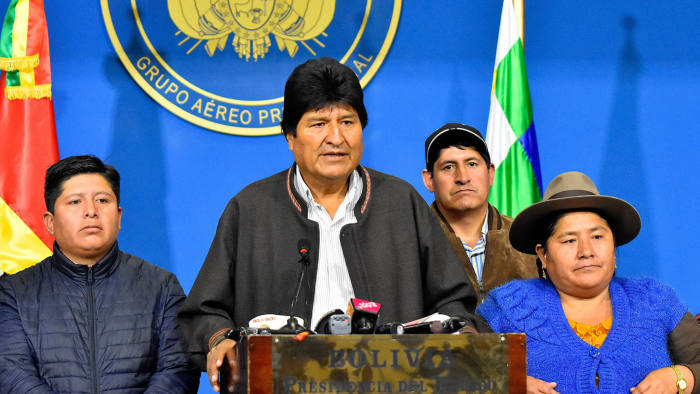A new MIT study has found no evidence of fraud in Bolivia’s 2019 election, despite allegations of serious irregularities by the Organization of American States (OAS), which led to the ousting of Evo Morales in a military coup.
John Curiel and Jack R. Williams examined the OAS’s report and published their findings in the Washington Post on February 27, 2020.
“As specialists in election integrity, we find that the statistical evidence does not support the claim of fraud in Bolivia’s October election,” they wrote.
The analysis by two researchers in MIT’s Election Data and Science Lab, made public last week, stated that an OAS finding that fraud helped Morales win was flawed and concluded that it was “very likely” the socialist president won the October vote by the 10 percentage points needed to avoid a runoff.
The MIT researchers said the OAS had adopted a “novel approach to fraud analysis” and that its statistical conclusions would appear to be “deeply flawed.”
Under the OAS’ odd criteria for fraud, it is even possible that U.S. elections, in which votes counted later in the day tend to lean Democratic, could be classified as fraudulent, the researchers said.
Curiel and Williams said they had reached out to the OAS for comment, but did not receive a response. The researchers ultimately warned that “relying on unverified tests as proof of fraud is a serious threat to any democracy.”
The study prompted Morales, who fled Bolivia first to Mexico and then to Argentina, to call on Sunday for the “democratic” international community to steward the May election carefully.
“The coup-mongers intend to disqualify our candidates,” Morales wrote on Twitter.
The MIT study was commissioned by the Center for Economic and Policy Research (CEPR). Its director Mark Weisbrot said on February 27, 2020 that the OAS “greatly misled the media and the public” about Bolivia’s election. “The OAS needs to explain why it made these statements and why anyone should trust it when it comes to elections,” he said.
Since the OAS claimed “deliberate” and “malicious” attempts had been made to rig the vote in favor of Morales the false accusation by the OAS headlines across the world unquestioningly declared “overwhelming evidence” of fraud.
The allegations were quickly seized upon by opposition forces and eventually led to a military coup, which saw a right-wing government headed by Jeanine Anez came to power. Morales was even forced to flee to Mexico and from there on to Argentina, where he was granted political asylum.
Morales told last November that the OAS had made a “political decision” and played a key role in deposing him, though Western media roundly dismissed him at the time including the Washington Post, which published the latest findings.
He even recalled attempting to contact OAS Secretary General Luis Almagro and warning an aide on the phone: “If you do not review your report … you are going to set Bolivia on fire and there are going to be deaths.”
Deaths did follow. Bolivia was engulfed in riots and protests between Morales supporters and security forces.
A Santiago, March 2, 2020 datelined Reuters report said:
The study by MIT experts that called into question the alleged election fraud that drove Bolivian President Evo Morales to resign has triggered sniping between left and right-leaning governments in Latin America.
The “Study casting doubt on Bolivian election fraud triggers controversy” headlined report said:
The OAS in a statement on Friday dismissed the MIT study as “unscientific.”
Bolivia will run a fresh election in May.
A spokesman for MIT said the study was conducted by its scientists on an independent basis for the Washington-based CEPR and did not necessarily reflect the views of the university.
Morales has said he will return to Bolivia, but has been charged by the caretaker government with sedition and blocked from running as a candidate for senator.
Latin American leaders’ reaction
Leaders of a number of left-leaning Latin American countries supportive of Morales have weighed in since the release of the MIT report, with Mexico asking the OAS to clarify its findings.
Venezuela’s socialist President Nicolas Maduro reiterated his claim that the OAS is a tool of the U.S., posting on Twitter on Sunday that the MIT study was “more proof that the Ministry of the Colonies (OAS) threatens the will of the free peoples of the continent.”
Argentine President Alberto Fernandez said the report’s findings justified his continued support for Morales.
“We demand the prompt democratization of Bolivia, with the full participation of the Bolivian people and without prescriptions of any kind,” Fernandez wrote on Twitter.
Conservative leaders in Latin America backed the OAS.
Ernesto Araujo, Brazil’s foreign minister, said fraud in Bolivia’s election had been “crystal clear.”
Tuto Quiroga, a former Bolivian president who is running in the next election, called the MIT study a “rehash of old lies.” Quiroga pointed out that Morales had himself asked the OAS to review the October election, called a fresh vote after the OAS report on the matter and dismissed members of Bolivia’s electoral board.










